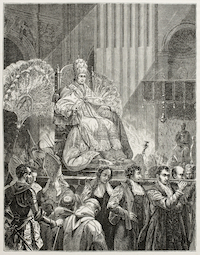
One of the most refreshing fruits of the Francis I pontificate is that it has awakened Roman Catholics to the truth that apostasy can originate from within the church. Paul warned,
“Let no man deceive you by any means: for that day shall not come, except there come a falling away first, and that man of sin be revealed, the son of perdition;” (2 Thessalonians 2:3)
Of this “falling away,” or apostasia, Paul included a chilling note. It would begin from within: “the son of perdition … as God sitteth in the temple of God, shewing himself that he is God” (2 Thessalonians 2:4). Indeed, speaking to bishops who could justifiably boast succession from the Apostles, he warned: “of your own selves shall men arise” (Acts 20:30). And Peter warned as well: “there shall be false teachers among you” (2 Peter 2:1). As we have observed repeatedly here, the Great Apostasy occurred in the late 4th century, bursting forth as a veritable font of liturgical, ecclesial and doctrinal novelty and error. It manifested upon the earth as what we now know as Roman Catholicism. It originated from within, for one cannot “fall away” from without.
The historical Roman Catholic objection to such a claim is as predictable as it is banal: “But that would mean Jesus has not kept His promise in Matthew 16. If the church ever fell into apostasy, then that would make Jesus a liar!” We invite the reader’s attention to such examples as this, which claims that “There was no great apostasy of true Christianity” because Jesus promised that the gates of hell would not prevail against His Church. Or this comment, in which a reader claimed that there could never be a widespread apostasy because Jesus promised that “the gates of hell would not prevail against the church.” Such objections presume first that we are claiming that the “True Church” could apostasize (we are not) and second, that Roman Catholicism is that “True Church” (it is not).
When we cite 2 Thessalonians 2:11 about the “strong delusion” by which God Himself would cause the vast majority to “believe a lie,” the Roman Catholic responds in a similar vein: “That is not possible because that would mean God purposely spread heresy and is the source of heresy.” Such responses again presume that Roman Catholicism is immune to error, and thus immune to an apostasy. Thus, the Roman Catholic historically has ruled out the very thing the Apostles clearly ruled in: that the great falling away would sweep up much of the church in its wake. Continue reading As God Sitteth in the Temple
 Follow
Follow